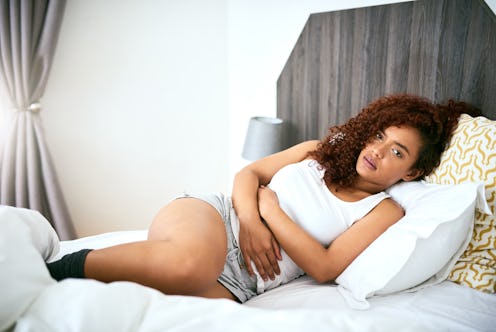Life
6 Weird Period Problems That Are Actually NBD

While we might feel comfortable talking to our friends about our periods and or weird period symptoms, there are some things that we don't talk about because we're worried that they're too different or taboo. We're worried that our experience is outside of the realm of normal, and we don't share these things with our friends because we don't want to be judged. But most of the things we hold closest to our chest are things we all go through, and there's truly no there's no reason to be fearful of your body.
It might never feel like it's the right time to ask your friend about the consistency of their flow for the sake of comparison. I get it, it's awkward, and some people are more shy about their bodily functions than others. You might wait eons until you find a moment where it seems natural for you to mention your period poops. It makes sense. But if you really look into the things that we deem as "weird" about our periods, it turns out that most of them are actually hugely normal. These are six different things that tons of women experience on their periods, even if they're too embarrassed to talk about it:
You Develop Migraines
The decline of estrogen at the end of your cycle can cause migraines, even if you've never had them before or don't get them otherwise. The decline in estrogen can make you more susceptible to aches and pain in general, but gnarly headaches are more common. You'll probably need some over-the-counter pain killers to combat this beast of a headache, but if that alone doesn't work, a few sips of caffeine might even help. But don't over-do it — too much caffeine can increase cramps. I know, you can't win.
Your Stomach Gets Funky
The change in your body's progesterone level during your period can affect your intestinal ~flow~, basically meaning it's the culprit of the infamous period poops. On the flip side, it can also cause constipation. Another reason your stomach might be acting funky is from the pain relievers you're taking for your cramps and headaches, so make sure to never take them on an empty stomach. It also might be due to the fact that you're eating differently to satisfy your period cravings. Just try to keep track of what you eat to see if there are patterns, and make sure you're hydrating, even if you feel like a walking ball of water already.
You Get Sick More Often
Before your period starts, your pH changes and the affects can swing both ways. If you have a yeast infection or are on the road to forming one, the environment your body creates for your period will likely kill it off or stop it from developing. On the flip side, that environment can also cause or promote bacterial infections. It's fine and normal and common, but if you're prone to yeast infections, make sure you change your tampon regularly and stay cool and clean and dry down there. And stay away from scented hygiene products — they tend to exacerbate the situation.
You "Literally Can't Even"
Do you ever feel like you're tripping over your feet or making up words or bumping into things whenever you have your period? Well, that's because you're super fatigued and you're not as alert as you usually are. All that work your lady parts are doing to give you a healthy period, is taxing, and you have to pay for it. Try not to sign up for a tightrope walking class during your period, you might want to wait a week.
Your Body Swells
The hormones that are released during your period cause you to retain water, so you're not actually gaining weight when you're menstruating, but you sure are bloated. The water weight will naturally shed and balance out after your period, so don't stress about it.
You Bleed Clots
Bloot clots in periods tend to freak people out, but they're very normal and nothing to worry about. While they might look disgusting and seem like they're indicative of something terribly wrong, they're not. Typically, your body will help break down your uterine lining with the help of anticoagulants — that's why for the most part, your flow is, well, flowing. But sometimes, especially when you're having a heavy period, there aren't enough anticoagulants to go around, and thus, some clots form. As long as they're smaller than a quarter, you're fine.
Images: Moyo Studio/E+/Getty Images; Giphy